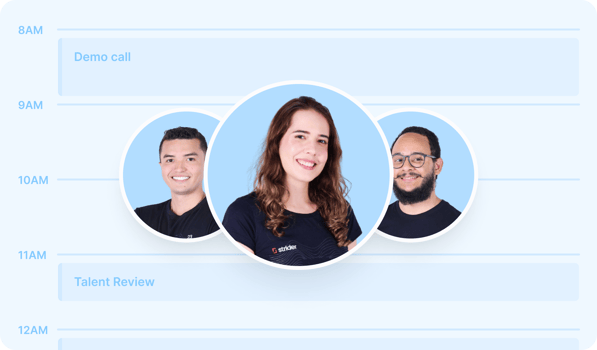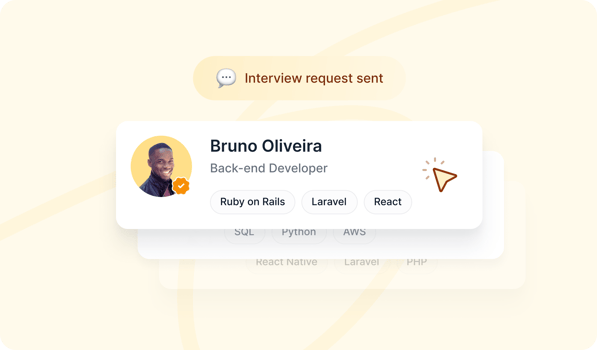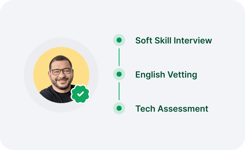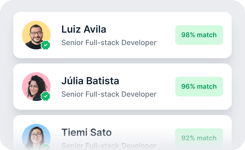Hire Remote MongoDB Developers
If you're in the market to hire MongoDB developers for your project, it's essential to know what you're looking for. MongoDB is a popular NoSQL database that is highly scalable and can store large amounts of data. As with any technology, you want talented MongoDB developers who can create efficient and effective solutions for your business needs.
The perfect MongoDB developer can create scalable apps, ensure high scalability and load balancing, and is familiar with data structures and ad hoc queries. They should also be able to work closely with your project manager and clients to ensure that the project meets their satisfaction. A non-disclosure agreement is also essential to protect your project's confidentiality.
By hiring dedicated MongoDB developers, you can be assured that you have a solely focused team on your project, ensuring timely delivery and cost-effective solutions. Whether you're a startup or an established business, hiring a dedicated team of MongoDB developers can help you store data efficiently and effectively and create custom solutions that fit your business needs. In this article, we will cover some things you need to know about hiring MongoDB developers, questions to ask during an interview, and common questions about the hiring process.
What to look for when hiring MongoDB Developers
If you are planning to hire dedicated MongoDB developers, there are several vital factors you need to consider before making a decision. These factors include technical skills, communication skills, and experience with MongoDB development. Additionally, it is crucial to evaluate the developer's ability to understand and meet your project requirements, their familiarity with new technologies, and their ability to work with other team members.
Technical Skills
When it comes to technical skills, there are several specific areas you should look for in MongoDB programmers. First, they should have experience working with NoSQL databases, particularly MongoDB. They should also be skilled in data modeling, database design, and query optimization. In addition, they should have experience working with MongoDB integration and high scalability, as well as load balancing and other performance-related tasks.
Another important technical skill to look for in MongoDB developers is expertise in programming languages such as Java, JavaScript, and Python. They should also know tools and technologies related to web development, such as HTML, CSS, and JavaScript frameworks like Angular or React. In addition, MongoDB developers should have experience working with MongoDB Cloud, MongoDB Integration, and MongoDB programming libraries.
Communication Skills
In addition to technical skills, communication skills are also essential for successful MongoDB development. Developers should have strong written and verbal communication skills and the ability to work collaboratively with other team members. They should be able to understand and interpret project requirements and articulate any issues or concerns.
Developers should also be able to provide regular updates on their progress and be open to feedback and suggestions from your team. Good communication skills will help ensure that your project is completed on time and to your satisfaction. Client satisfaction is vital, so good communication skills are essential to ensure the project is delivered on time and meets the client's needs.
MongoDB Cloud Database
When hiring MongoDB developers, consider their experience with the MongoDB Cloud Database. This database is a fully managed cloud service that provides automated scaling, backup and recovery, and security features for MongoDB. Developers familiar with MongoDB Cloud Database will be able to efficiently build, test, and deploy scalable applications in the cloud.
To work with MongoDB Cloud Database, developers should have a strong understanding of the core features and functionality of the database, as well as the tools and services available in the MongoDB Atlas platform. This includes familiarity with cloud providers like Amazon Web Services (AWS), Google Cloud Platform (GCP), and Microsoft Azure and experience with database design, data modeling, and query optimization.
Developers with experience with MongoDB Cloud Database will also be well-versed in the best practices for building high-performance, scalable applications in the cloud. This includes load balancing, distributed systems, and optimizing queries for efficient data retrieval.
Project Management
Project management is critical to any software development project, including MongoDB development. When hiring MongoDB developers, it's essential to look for individuals who are experienced in project management and can manage the development process effectively.
One significant factor in project management is the ability to manage deadlines. MongoDB development projects can be complex, and it's crucial to have a developer who can stay on track and ensure that all deliverables are completed on time.
Finally, looking for a developer familiar with agile methodologies is essential. Agile development is becoming increasingly popular in the software industry, and it's necessary to have a developer who understands the principles and can work effectively in an agile environment. By finding the right developer, you can ensure that your MongoDB development project is successful and meets your business needs.
Top 5 MongoDB Developer Interview Questions
To hire MongoDB developers, ask the right interview questions to assess their skills and knowledge. Here are the top 5 MongoDB developer interview questions you should consider asking:
What is the usage of profiler in MongoDB?
A profiler is an essential tool in MongoDB for tracking database operations, identifying slow queries, and optimizing performance. By asking this question, you can evaluate a candidate's knowledge of profiling techniques, which is crucial for monitoring and improving MongoDB database performance. A possible answer to this question could be that the profiler captures database operations and writes them to a system collection that can be analyzed later.
Does MongoDB support ACID Transaction? Define ACID Transaction.
This question can help you assess the candidate's familiarity with ACID properties and ability to apply them to MongoDB. ACID stands for Atomicity, Consistency, Isolation, and Durability, and it's a set of properties that guarantee reliable and consistent database transactions. A possible answer to this question could be that MongoDB supports ACID transactions at the document level and can ensure data consistency even in the case of hardware or software failures.
Up to what extent does the data expand to multi-slice?
MongoDB uses sharding to partition data horizontally across multiple servers, which allows for high scalability and availability. By asking this question, you can evaluate a candidate's knowledge of sharding concepts and ability to design and implement a sharded cluster. A possible answer to this question could be that MongoDB can shard data across multiple slices, which can be scaled independently based on the application's needs.
How do applications access the real-time data modifications in MongoDB?
MongoDB provides several mechanisms to access real-time data modifications, including Change Streams, Reactive Extensions, and GridFS. By asking this question, you can evaluate a candidate's knowledge of MongoDB's real-time data capabilities and their ability to build scalable and responsive applications. A possible answer to this question could be that applications can use Change Streams to receive real-time notifications of data changes and react accordingly.
Explain the working mechanism of Journaling work in MongoDB.
Journaling is a mechanism in MongoDB that ensures durability by writing data changes to a journal before writing them to the database. By asking this question, you can evaluate a candidate's knowledge of MongoDB's durability mechanisms and their ability to design and optimize MongoDB database performance. A possible answer to this question could be that MongoDB writes data changes to a journal before writing them to the database to ensure that changes are durable and recoverable in the case of a crash or other failure.









